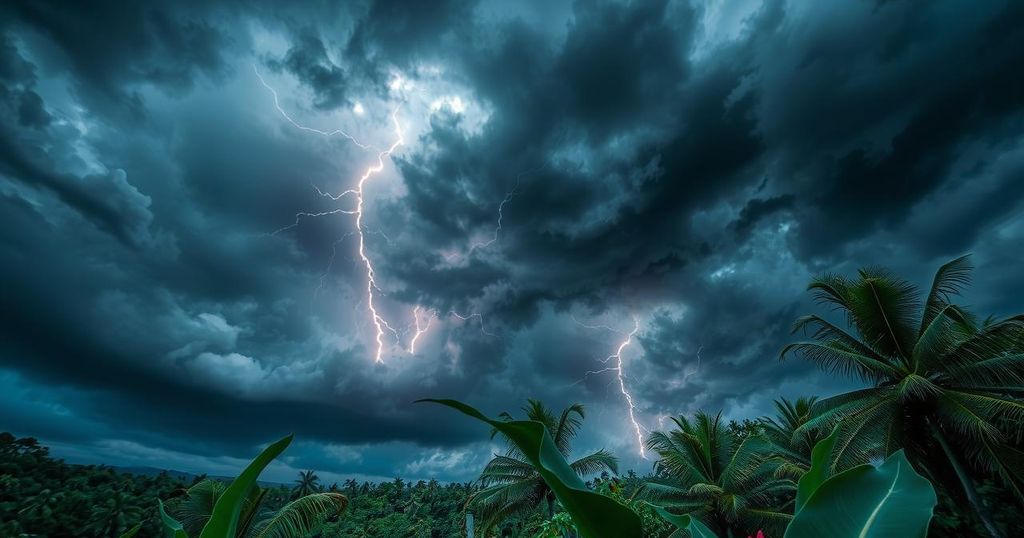Cuban Residents Prepare as First Tropical Wave of the Season Approaches
The first tropical wave of the season is set to bring rain and thunderstorms to Cuba starting Tuesday, initially affecting the eastern regions. Increased precipitation and electrical activity are expected, with updates on potential heavy rains and severe storms. This wave marks the traditional commencement of the rainy season in Cuba, coinciding with NOAA’s forecast of a highly active hurricane season ahead.
This week, the Caribbean is bracing for the first tropical wave of the season, which is anticipated to deliver notable rain and storms particularly in Cuba. Meteorologist Raydel Ruisánchez highlighted on social media that this weather system, intensified by daytime heat and upper-level cyclonic circulation, is expected to generate an uptick in showers and thunderstorms, predominantly during the afternoons.
Rainfall is set to commence on Tuesday in eastern Cuba, gradually spreading westward across the island in the subsequent days. Ruisánchez noted they would be keeping a close eye on the system’s progression, given the likelihood of heavy rains and potentially severe storms that are typical for this time during Cuba’s rainy season.
By Sunday afternoon, forecasts from Ruisánchez indicated that rainfall would be particularly concentrated in the western regions. Notably, the interior and northernmost parts of western Cuba would witness increased precipitation, while other areas may experience only isolated rain or remain completely dry.
The meteorologist also pointed out that these rains would be accompanied by electrical activity. The warnings come from rainfall accumulation predictions he based on various local forecasting models, which pointed to the risks of thunderstorms this week.
Cuban meteorologist José Rubiera provided additional context, stating that although the first tropical wave of the year has originated from Africa, it poses no threat. In a video on his YouTube channel, Rubiera remarked, “It’s an interesting thing, it remains interesting, although it is a weak system. The first tropical wave of this year departed yesterday, Sunday the 18th, from Africa. A weak system moving through the Atlantic without any consequences.”
Additionally, the National Oceanic and Atmospheric Administration (NOAA) released its official outlook for the forthcoming hurricane season, anticipating an “above average” scenario for 2025. Their forecast suggests the potential formation of 13 to 19 named storms, with 6 to 10 likely to escalate into hurricanes. Of these, between 3 to 5 storms could reach major hurricane categories.
This prediction comes amid warmer-than-normal Atlantic and Caribbean surface temperatures and a neutral phase of the El Niño-Southern Oscillation (ENSO), which, unlike a more active El Niño, does not impede cyclone formation. A more vigorous western African monsoon may also contribute to an increase in tropical waves, considered the seeds from which hurricanes may develop.
As the first tropical wave approaches, several questions arise regarding its implications for Cuba. Residents can expect a significant increase in rainfall and thunderstorms, starting Tuesday in the east and subsequently affecting the entire country. Rain will likely escalate gradually, primarily in the afternoons.
It is vital for citizens to stay updated on weather developments and exercise caution, particularly in low-lying areas prone to flooding or poor drainage. Since May marks the onset of Cuba’s rainy season, the arrival of this tropical wave is a typical occurrence, bringing heightened humidity and the formation of afternoon storms and rainfall.
The first tropical wave of the season is poised to impact Cuba with significant rainfall and thunderstorms beginning Tuesday, particularly in eastern regions before spreading nationwide. This weather event coincides with the start of the rainy season and highlights natural phenomena that can lead to hazardous conditions. Moreover, the NOAA prediction of an above-average hurricane season underscores the need for vigilance.
Original Source: en.cibercuba.com




Post Comment